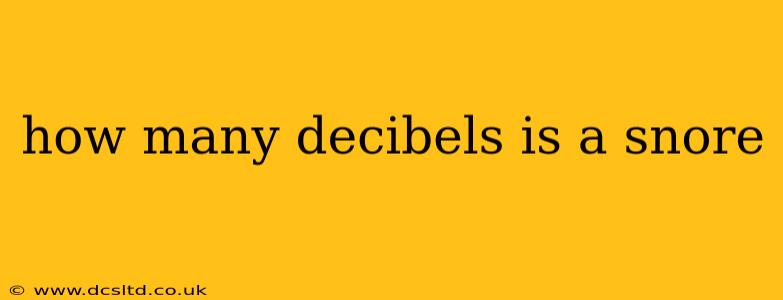How Many Decibels is a Snore? The Loudness of Sleep Sounds
Snoring loudness is highly variable, ranging from a barely audible hum to a deafening roar that can disrupt the sleep of partners and even neighbors. There's no single answer to "how many decibels is a snore?" because it depends on several factors. This article will delve into the science of snoring decibels, explore the factors influencing loudness, and address some frequently asked questions.
What is a Decibel?
Before diving into snoring decibels, let's clarify what a decibel (dB) is. A decibel is a unit used to measure the intensity of sound. The decibel scale is logarithmic, meaning that a small increase in decibels represents a significant increase in sound intensity. For example, a 10dB increase is perceived as roughly a doubling of loudness.
How Loud Can Snoring Get?
The average snore registers between 30 and 60 decibels. This is comparable to the sound of a quiet conversation (around 40-50dB) or a running refrigerator (around 45dB). However, some individuals can snore much louder. Loud snoring can reach 80 decibels or more, comparable to a vacuum cleaner (around 70dB) or even a passing motorcycle (around 80-90dB). Extremely loud snoring, exceeding 80dB, can be a significant source of disturbance and can even damage hearing over prolonged exposure.
What Factors Affect Snore Loudness?
Several factors contribute to the loudness of snoring:
- Airflow Obstruction: The degree of airway blockage is a major determinant. The more restricted the airflow, the greater the vibration of tissues and the louder the snore.
- Tissue Characteristics: The size, shape, and elasticity of tissues in the throat (such as the soft palate, uvula, and tonsils) influence how readily they vibrate and produce sound.
- Body Position: Sleeping on your back often exacerbates snoring as gravity can further restrict the airway. Sleeping on your side usually improves airflow and reduces snoring volume.
- Weight: Being overweight or obese is strongly associated with louder snoring due to increased tissue in the throat and neck.
- Alcohol and Sedatives: These substances relax throat muscles, increasing the likelihood of airway obstruction and louder snoring.
What's Considered "Loud" Snoring?
While 30-60dB is considered the average range, snoring above 60dB is generally considered loud enough to be disruptive to sleep partners. Snoring above 80dB is significantly loud and may indicate a more serious underlying issue.
How Can I Measure the Decibels of My Snore?
There are several ways to measure the decibels of your snore:
- Smartphone Apps: Many smartphone apps are available that utilize your phone's microphone to measure sound levels in decibels. The accuracy may vary depending on the app and the environment.
- Dedicated Sound Level Meters: For more precise measurements, a dedicated sound level meter can be purchased. These devices are more accurate and reliable than smartphone apps. However, these are not typically used at home.
Can Loud Snoring Indicate a Medical Problem?
Yes, very loud snoring can be a symptom of sleep apnea, a condition where breathing repeatedly stops and starts during sleep. Other potential medical issues associated with loud snoring include nasal congestion, allergies, and enlarged tonsils or adenoids. If you or your sleep partner are concerned about the loudness of your snoring, it's crucial to consult a doctor. They can conduct a thorough evaluation and recommend appropriate treatments.
Conclusion: Understanding Snore Decibels
Snoring loudness varies widely, but understanding the decibel levels and contributing factors can help you manage this common sleep issue. While a moderate snore might be a minor annoyance, excessively loud snoring can significantly impact sleep quality and may signal underlying health problems. If you're concerned about your snoring, seek professional medical advice.
